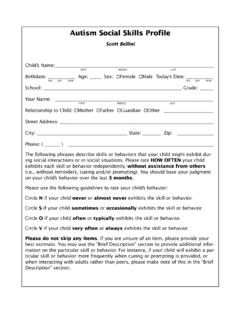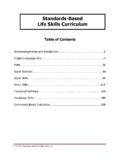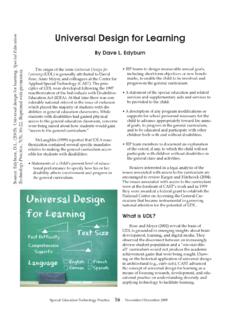Transcription of PSYCHOLOGICAL EVALUATIONS: WHAT EVERY PARENT …
1 PSYCHOLOGICAL EVALUATIONS: WHAT EVERY PARENT SHOULD KNOW. By Andrea Canter, PhD, NCSP. Minneapolis Public Schools The prospect of a PSYCHOLOGICAL evaluation can cause a great deal of anxiety on the part of parents. When school personnel or physicians recommend such an evaluation , parents might imagine strange and intrusive procedures followed by diagnoses that further increase their apprehension. No one wants to hear that their child may have a disability, mental health disorder, or behavior problem. Yet, when conducted by qualified school-based or community professionals, PSYCHOLOGICAL evaluations can be invaluable tools in understanding and addressing the learning and mental health needs of individual students and can positively affect the student's schooling and family life.
2 Sometimes, however, evaluations are conducted for the wrong reasons, using inappropriate methods, or with little regard for how parents and school personnel may use the results. Even competent PSYCHOLOGICAL evaluations, if ignored or misunderstood, can lead to serious disagreement between parents and school personnel. Inappropriate or inadequate supports for student learning and/or behavior may result. PSYCHOLOGICAL evaluations are much more useful when parents understand the purpose, strengths, and limitations of the various procedures, and if they have realistic expectations for the value of the results.
3 Parents who understand the nature of PSYCHOLOGICAL evaluations will be less apprehensive and better able to effectively participate in both the evaluation and any resulting services for their child. Planning the PSYCHOLOGICAL evaluation Purpose of the evaluation . A PSYCHOLOGICAL evaluation is a set of procedures, often including tests, that is administered by a licensed psychologist or credentialed school psychologist to obtain information about a student's learning, behavior, or mental health. In school settings, evaluations can be requested by parents, school personnel, and older students who are of majority age.
4 School psychologists most often conduct evaluations as part of the special education team's determination as to whether a student has a disability and is eligible for special services. However, they might also conduct evaluations to help develop teaching or behavior plans for students, to identify significant mental health concerns, or to determine eligibility for gifted programs or school readiness. Due process. When school teams consider special education services, evaluations must be conducted according to due process procedures requirements that parents of minor students be notified of the need for an evaluation , invited to a planning meeting, and give their consent for the evaluation .
5 Any PSYCHOLOGICAL evaluation conducted for other purposes also requires PARENT consent. Students who have reached the age of majority must be included in planning the evaluation and give their own consent. Involvement in planning. You should always be invited to a school conference to discuss the need for a PSYCHOLOGICAL evaluation and should be given ample notice of the date and time of a meeting. You should feel comfortable in asking any questions about the reason for the evaluation and how the results will be used to help your child. Sometimes it helps to bring a trusted friend or family member to the meeting for moral support as well as to help clarify questions and answers.
6 After all, two sets of ears are better than one. Always remember that you must give permission before an evaluation can begin. If you do not understand all of the issues, or if you need more time to think about it, you have the right to ask for more time before making a decision. Community evaluations. The same considerations apply to evaluations conducted in the community. If your physician recommends an evaluation , be sure you understand why and how the evaluation will help your child. Set up an appointment with the person who will conduct the evaluation in order to ask questions and to feel comfortable with the process.
7 Be sure to check with your health care provider Helping Children at Home and School II: Handouts for Families and Educators S2 53. regarding what services are covered by your insurance of ability and achievement to identify a possible and what costs might be incurred if you will be learning or cognitive disability. Generally, psychologists'. responsible for paying for all or part of the evaluation . If evaluation procedures fall into the following categories. the evaluation is to address a school-related problem, Standardized tests. Psychologists often use you should first find out if your child is entitled to standardized tests of various abilities in order to receive the evaluation through the school district, which compare an individual's performance to an appropriate would be a free service.
8 With community evaluations, it peer group. These tests are developed and normed is crucial that you understand who will receive a report (given to many individuals to determine how typical of the results. Remember that only you, the PARENT , can individuals perform) under standard conditions using give permission to share these results with others. (The prescribed instructions, materials, scoring to assure exception would be a court-ordered evaluation .) consistent and accurate results. Some common examples include the Wechsler Intelligence Scale for Limitations of PSYCHOLOGICAL Evaluations Children (WISC), the Woodcock Johnson Psycho- It is important to recognize what PSYCHOLOGICAL Educational Battery, and the Kaufman Tests of evaluations do and do not provide.
9 PSYCHOLOGICAL Educational Achievement. evaluations can provide estimates of intellectual ability. Rating scales. Rating scales are most often used to PSYCHOLOGICAL evaluations also document the presence determine if certain behaviors or skills are present or or absence of both positive and negative characteristics, typical of the student. Ratings depend on the perceptions such as strengths in reasoning or vocabulary or and opinions of the rater. The rater(s) must be very weaknesses in memory, self-confidence, or depression. familiar with the student in order to provide useful However, PSYCHOLOGICAL evaluations seldom give information; using multiple raters helps reduce the guidance in selecting specific methods for teaching or influence of biased perceptions.
10 Ideally the rating scales determining appropriate class assignment or grade are normed (developed) on similar student populations placement, generally cannot provide information about so that results indicate if a student's skill, behavior, or the quality of instruction, and rarely provide insight emotional status is typical or significantly different regarding why certain characteristics or problems exist. from peer groups. Examples of commonly used rating Findings may help professionals develop ideas regarding scales include the Behavior Assessment System for the why, but answering such questions (if possible) Children (BASC) and Vineland Adaptive Behavior Scales.








